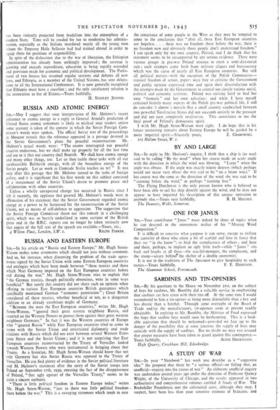RUSSIA AND EASTERN EUROPE
Sta,—In his article on "Russia and Eastern Europe," Mr. Hugh Scion- Watson makes some statements which should not pass without comment. And so, for instance, when discussing the problem of the trade agree- ments signed by the Soviet Union with some Eastern European countries and analogies which have been made between "these. treaties and those which Nazi Germany imposed on the East European countries before and during the war," Mr. Hugh Seton-Watson tries to explain that "the German treaties, though politically obnoxious, were in some ways beneficial." But surely this country did not share such an opinion when offering to various East European countries British guarantees which specifically mentioned German "economic penetration" ; Great Britain considered all these treaties, whether beneficial or not, as a dangerous addition to an already exorbitant might of Germany.
"Between the wars the East European countries," writes Mr. Hugh Seton-Watson, "ignored their great eastern neighbour Russia, and counted on the Western Powers to protect them against their great western neighbour Germany." In fact it was the Western countries of Europe who "ignored Russia" while East European countries tried to come to terms with the Soviet Union and entertained diplomatic and trade relations with Russia which did not exist between several Western Euro- pean States and the Soviet Union ; and it is not surprising that East European countries reconstructed by the Treaty of Versailles looked towards Western Powers who were instrumental in bringing about that Treaty. As a historian, Mr. Hugh Seton-Watson should know that not only Germany but also Soviet Russia was opposed to the Treaty of Versailles. He can find plenty of evidence in the Soviet political literature and M. Molotov's statement after the entry of the Soviet troops into Poland on September 17th, 1939, stressing the fact of the disappearance of Poland, "that ugly upstart of the Versailles Treaty," seems to be quite a sincere outburst.
"There is little political freedom in Eastern Europe today," writes Mr. Hugh Seton-Watson, "just as there was little political freedom . there before the war." This is a sweeping statement which tends to ease the conscience of some people in the West as they may be tempted to come to the conclusion that "after all, these East European countries are hopeless . . . there was no freedom there before the war, there is no freedom now and obviously those people don't understand freedom." I can speak only for my own country, Poland, and I do think that his statement seems to be unsupported by any serious evidence. There were various groups in pre-war Poland anxious to exert a semi-dictatorial rule ; such attempts came both from military cliques and bureaucracy which was the curse of nearly all East European countries. But still all political parties—with the exception of the Polish Communists— enjoyed freedom of action, papers were free to criticise the Government and public opinion expressed time and again their dissatisfaction with the attempts made by the Government to control too closely various social, political and economic activities Poland was striving hard to find her own " formula " and her own salvation: and while I have myself criticised bitterly many aspects of the Polish pre-war political life, I still do consider it almost a miracle that a small country sandwiched between two powerful Totalitarian Staves did not succumb entirely to the pressure and did not turn completely totalitarian. This constitutes to me the final proof of Poland's democratic spirit.
I wish Mr. Hugh Seton-Watson were right. I do hope that in his future interesting remarks about Eastern Europe he will be guided by a
more impartial spirit.—Sincerely yours, Z. GRABOWSKI. 105 Hallam Street, W. z.






























 Previous page
Previous page